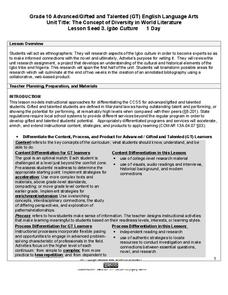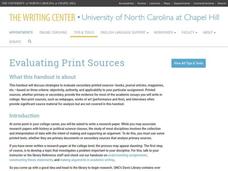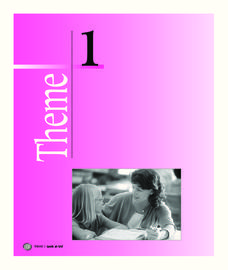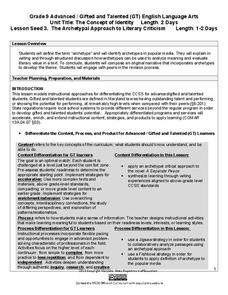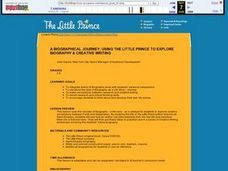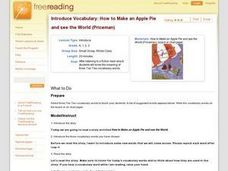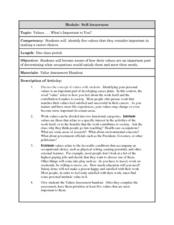Scholastic
What’s the Good Word? Etymology Project Guidelines
Who named the shapes, or the days of the week? Should words be removed from the dictionary if they're no longer commonly used? Are there too many words in the English language? Language arts students explore these and additional...
Baruch College Writing Center
Summarizing, Paraphrasing, and Quoting Workshop
What's the difference between summarizing and paraphrasing? Show class members how to find the main ideas from informational text and condense it, restate it, or quote it directly with a series of educational activities based on two...
Maryland Department of Education
The Concept of Diversity in World Literature Lesson 3: Igbo Culture
What cultural concepts must readers understand in order to connect to Things Fall Apart? As part of their study of Chinua Achebe’s novel, class members research Nigeria and the Igbo culture to create a collaborative, web-based, annotated...
Houghton Mifflin Harcourt
Surprise!: English Language Development Lessons (Theme 2)
Surprise! is the theme of this series of ESL lessons. Cover an array of topics such as where we live, different times of day, shapes, the city and the country, what we do for fun, jobs, and games, all while practicing how to express...
CC Homestead
Summarize
Designed for third graders but appropriate for older learners as well, this packet of materials underscores the necessity of teaching kids how to summarize, how to identify main ideas and supporting details, and how to ask questions...
University of North Carolina
Evaluating Print Sources
Not all sources are created equal, so how do you evaluate them? Writers learn how to evaluate print sources based on elements such as audience, tone, and argument in the sixth handout of 24 in the Writing the Paper series from the...
Pulitzer Center
"Voices from Haiti": Using Poetry to Speak up for a Cause
Explore a real world use of poetry with your class! Young language arts pupils consider the concept of advocacy and how journalism, photography, and poetry can raise awareness for a cause. They read several poems about individuals...
College Board
AP® English Language: Reading and Writing Analytically
How can teachers ensure their pupils are well prepared for the AP® English exam? The reference material is a good place to start! Educators read seven essays detailing best practices for teaching scholars to read critically and write...
Houghton Mifflin Harcourt
Look at Us!: Extra Support Lessons (Theme 1)
Support struggling learners and focus on the alphabet with the three weeks of activities and materials provided here. Each day, learners review some letters and practice others in depth. They work on rhyming, practice new words, and...
Curated OER
Write to a Member of Congress
Students discover how to identify and contact their local Representative. They can send an email or a regular letter to their Representative voicing their concerns. They share with the class any responses.
Maryland Department of Education
The Concept of Identity Lesson 3: The Archetypal Approach to Literary Criticism
As class members continue their study of approaches to literary criticism, readers examine the symbolism and archetypal patterns in John Knowles' A Separate Peace, and how these parallels are used to develop a theme in the story.
Crafting Freedom
Harriet Jabocs and Elizabeth Keckly: The Material and Emotional Realities of Childhood in Slavery
Through the journals written by Harriet Jacobs and Elizabeth Keckly, young readers gain insight into the lives of two enslaved children on nineteenth-century plantations.
Virginia Department of Education
Synthesizing to Support a Thesis- Big Picture Emphasis
Help your researchers as they begin to develop a topic for research with these worksheets. Included are two nicely designed graphic organizers that assist students in narrowing and researching their topic, and an efficient evaluation...
Curated OER
Who Knows? Your Privacy in the Information Age
Teach young adults how to become advocates for their privacy in the modern information age. In a series of five lessons, learners explore their beliefs and opinions about privacy vs. the actual laws regarding who has the right to access...
Curated OER
Journeying to Create
Show a video clip that descripes how taking a journey can change a person's outlook on life. Learners write a paragraph about a place that uses imagery and tone to create a specfic effect. They evaluate their journal entries as well.
Curated OER
A BIOGRAPHICAL JOURNEY: USING THE LITTLE PRINCE TO EXPLORE BIOGRAPHY & CREAIVE WRITING
Young scholars integrate Author and Biography study with Students personal perspective. They make connections between research and creative writing. Young scholars enrich research and critical thinking skills. They encourage students to...
Curated OER
How to Summarize
Students review techniques on how to read a passage smoothly making the words connect, and with expression. They then read the instruction to the chapter in their science book and answer questions that are written on the board. They...
Curated OER
Introduce Vocabulary: How to Make an Apple Pie and See the World
Students explore language arts by reading a fiction book in class. For this tier two vocabulary lesson, students read the book How to Make an Apple Pie and See the World and identify the use of specific vocabulary words. Students define...
University of North Carolina
Annotated Bibliographies
When researchers write a paper, they become curators of information. It's their job to determine the best sources of information on a topic and use those sources to inform their writing. As part of a larger series, a handout on annotated...
Apple State University
Friendly Letter Mini-Lesson
This mini-lesson plan about informal letter writing is packed with a lot of information about writing a friendly letter. Class members begin by working in pairs to answer questions after reviewing letter models. Then, take part in a...
Bierbaum Elementary School
Practicing Patience
As teachers, we have a lot of patience. Our scholars, on the other hand, may need some support. Give your pupils the emotional intelligence instruction they desire with a lesson designed to teach patience through grand conversation,...
Scholastic
Choose Your Words Wisely (Grades 9-12)
Words, words, words. The function of words in persuasive writing is the focus of a group activity that asks members to analyze how words advertisers use are designed to influence targeted audiences.
Curated OER
Values...What's Important to You?
As your scholars begin their career study, it's important they understand their personal intrinsic values. What makes them feel rewarded? There are discussion prompts here to get learners thinking about specific careers, and they also...
Novelinks
Zach’s Lie: The K-W-H-L Strategy
The attached resource is no lie! The K-W-H-L activity, which is fourth in a series of seven, serves as a pre- and post-assessment. First, pupils brainstorm what they know about a specific topic, then they list what they want to know, how...




